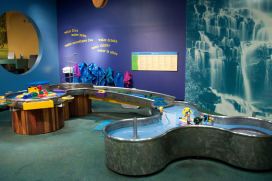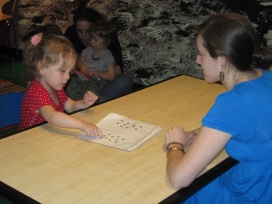Mid-Atlantic & Southeast Region


States in this Region: AL, DE, FL, GA, KY, LA, MD, MS, NC, OH, SC, TN, TX, VA, WV
Kids Room at Maryland Science Center: The Kids Room is a 5000 square foot space designed specifically for early childhood visitors (from birth to eight years of age) and their caregivers. In the Kids Room, children can experiment with cause-and-effect relationships, discover the forces of gravity and magnetism, explore the natural world, and exercise their imaginations. Children can dive into water play where hand pumps, fountains, dams, river channels, and nozzles keep their hands and minds in motion or create a building to withstand the earthquake table. Visitors from birth–24 months can explore Room to Grow, a special sensory rich zone where the pace and activity level is scaled appropriately to baby and toddler development. The Kids Room was designed with a team of early childhood advisors and provides an environment with a myriad of child development information for caregivers. The space includes a Learning Lab resource center that provides print resources, activity ideas, book lists, and other take-home materials to families and educators of young children. The Learning Lab also serves as activity space, housing drop-in activities, classroom programs, home school programs, and summer camp sessions. The Kids Room and Learning Lab are staffed by full time early childhood educators committed to creating a unique learning experience for every child. The Kids Room Living Lab was established in December 2011, with Johns Hopkins as their academic partner.
Laboratory for Child Development at Johns Hopkins University: The Laboratory for Child Development investigates how infants and children perceive and reason about the world around them. The lab explores such topics as how infants and children remember hidden objects, learn new words, and think about number and mathematics. Laboratory partners in this project are Lisa Fiegenson and Justin Halberda. Dr. Feigenson’s work centers on infants and young children, and draws from and unites research in numerical cognition, object-based attention, and short-term memory. By examining key points in development, she hopes to gain insight into the role played by a set of representations as new knowledge is acquired, and as new knowledge structures are created. Dr. Halberda's research focuses on two main topics: The first is an interest in language acquisition and the possibility that logical deductive inference may play a role in the learning of new words. The second is an interest in the organization of attention and the connection of mind to world. He and his students work with infants, children and adults using classic anticipatory-looking paradigms and eye-tracking as well as computational modeling. Studies conducted by the Laboratory for Child Development are set up as interactive games that typically take about 15 minutes to complete. Children who participate are asked to play with small toys, learn names for novel objects, or play guessing games with an experimenter.